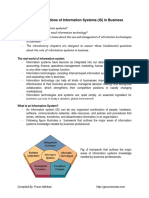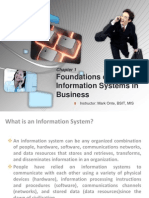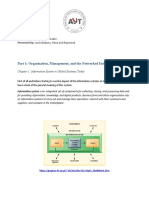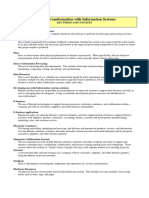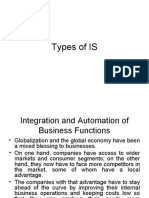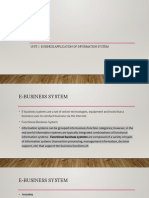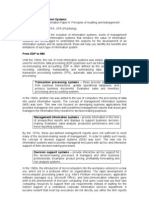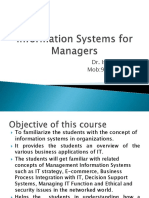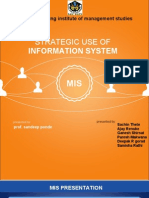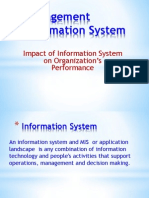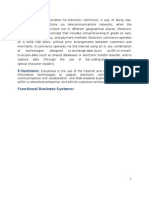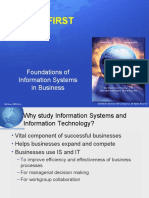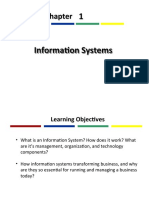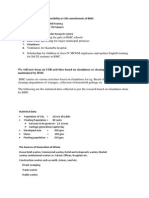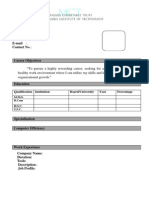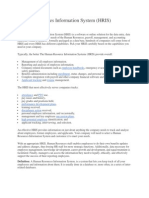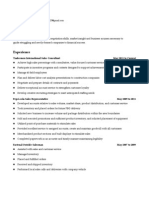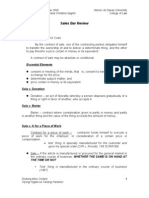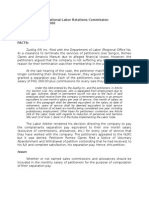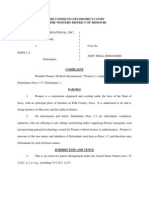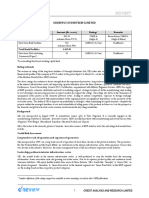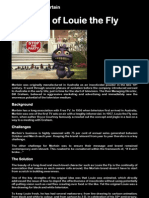0 ratings0% found this document useful (0 votes)
44 viewsManagement Information System
Management Information System
Uploaded by
YasHesh MorkhiaE-business involves using internet technologies to empower business processes, electronic commerce, and enterprise collaboration within and between companies. It can be considered any online exchange of value and falls under three main categories: re-engineering internal business processes, implementing electronic commerce systems with customers and suppliers, and promoting enterprise collaboration. Companies rely on e-business applications supported by intranets and extranets to achieve these goals.
Copyright:
© All Rights Reserved
Available Formats
Download as PPTX, PDF, TXT or read online from Scribd
Management Information System
Management Information System
Uploaded by
YasHesh Morkhia0 ratings0% found this document useful (0 votes)
44 views11 pagesE-business involves using internet technologies to empower business processes, electronic commerce, and enterprise collaboration within and between companies. It can be considered any online exchange of value and falls under three main categories: re-engineering internal business processes, implementing electronic commerce systems with customers and suppliers, and promoting enterprise collaboration. Companies rely on e-business applications supported by intranets and extranets to achieve these goals.
Original Description:
MIS for MMS
Copyright
© © All Rights Reserved
Available Formats
PPTX, PDF, TXT or read online from Scribd
Share this document
Did you find this document useful?
Is this content inappropriate?
E-business involves using internet technologies to empower business processes, electronic commerce, and enterprise collaboration within and between companies. It can be considered any online exchange of value and falls under three main categories: re-engineering internal business processes, implementing electronic commerce systems with customers and suppliers, and promoting enterprise collaboration. Companies rely on e-business applications supported by intranets and extranets to achieve these goals.
Copyright:
© All Rights Reserved
Available Formats
Download as PPTX, PDF, TXT or read online from Scribd
Download as pptx, pdf, or txt
0 ratings0% found this document useful (0 votes)
44 views11 pagesManagement Information System
Management Information System
Uploaded by
YasHesh MorkhiaE-business involves using internet technologies to empower business processes, electronic commerce, and enterprise collaboration within and between companies. It can be considered any online exchange of value and falls under three main categories: re-engineering internal business processes, implementing electronic commerce systems with customers and suppliers, and promoting enterprise collaboration. Companies rely on e-business applications supported by intranets and extranets to achieve these goals.
Copyright:
© All Rights Reserved
Available Formats
Download as PPTX, PDF, TXT or read online from Scribd
Download as pptx, pdf, or txt
You are on page 1of 11
Role of e-Business in Business
1. E-business as the use of Internet technologies to
work and empower business processes, electronic
commerce and enterprise collaboration within a
company and with its customers, suppliers and
other business stakeholders.
2. E-business can be more generally considered an
online exchange of value.
3. Any online exchange of information, money,
resources, services, or any combination there of,
falls under the e-business umbrella.
4. Internet and Internet like N/Ws:
Inside the enterprise(intranets) and between an
enterprise and its trading partners(extranets) have
become the primary IT infrastructure that support
the e-business applications of many companies
5. Companies relies on e-business applications to
a. Re-engineer internal business processes.
b. Implement electronic commerce system with their
customers and suppliers.
c. promote enterprise collaboration among business
teams and workgroups.
Enterprise Collaboration Systems
Involve the use of s/w tools to support
communication, co-ordination and collaboration
among the members of networked teams and
workgroups.
A business may use Intranets, the Internet, extranets
and other n/ws to implement such systems.
Eg. Employers and external consultants may form a
virtual team that uses a corporate intranet and the
Internet for electronic mail, videoconferencing,
electronic discussion groups and web pages of work-
in-progress information to collaborate on business
projects.
Electronic Commerce
It is the buying and selling and marketing and servicing of
products, services and information over a variety of
computer n/ws.
Many business use the Internet, intranets, extranets and
other n/ws.
This might include everything from advertising, sales and
customer support on the www to Internet Security and
payment mechanism that ensure completion of delivery
and payment processes.
Ecommerce system include Internet website for online
sales, extranet access of inventory database by large
customers and the use of corporate intranets by sales
representatives to access customers records for customer
relationship ,management.
Types of Information System
1. Operation support System:
Information system have always been needed to process
data generated by and used in business operations.
Such operation support system produce a variety of
information products for internal and external use.
The role of a business firms operation support systems is
to efficiently process business transactions, control
industrial processes, support enterprise communications
and collaboration and update corporate database.
1.1 Transaction Processing System
Process data resulting from business transactions, update
operational databases and produce business documents.
eg. Sales and inventory processing and Accounting system.
1.2 Process Control System:
Monitor and control industrial(physical) processes.
Eg. Petroleum refining, power generation and steel
production systems.
1.3 Enterprise Collaboration Systems:
Support team , workgroup and enterprise communications
and collaborations.
Eg. Email, chat and videoconferencing groupware systems.
2. Management Support System
When information system applications focus on providing
information and support for effective decision making
by managers, they are called Management Support
System
a) MIS: It provides information in the form of prespecified reports
and display to support business making. Eg. Sales analysis,
production performance and cost trend reporting systems.
b) Decision Support Systems: Provide interactive adhoc support
for the decision-making processes of managers and other
business professionals. Eg. Product pricing, profitability for
ecasting and risk analysis system.
c) Executive information Systems: Provide critical information
from MIS, DSS and other sources tailored to the information
needs of executives.
eg. Systems for easy access to analyses of business
performance, actions of competitors and economic
developments to support strategic planning.
Other categories of Information Systems
1. Expert Systems: Knowledge based systems that
provide expert advice and act as expert consultants
to users.
Eg. Credit application advisor, process monitor and
diagnostic maintenance systems.
2. Knowledge Management Systems: knowledge based
systems that support the creation, organization and
dissemination of business knowledge within the
enterprise.
Eg. Internal access to best business practices, sales
proposal strategies and customer problem resolution
systems.
3. Strategic information Systems: Support operations or
management processes that provide a firm with
strategic products, services and capabilities for
competitive advantage.
Eg. Online stock trading, shipment tracking and e-
commerce web systems.
4. Functional Business Systems: Support a variety of
operational and managerial applications of basic
business functions of a company.
Eg. Information systems that support applications in
accounting, finance, marketing, operations
management and human resource management.
The IS Functions
1. A major functional area of business equally as
important to business success as the functions of
accounting, finance, operations management,
marketing and human resources management.
2. An important contributor to operational efficiency,
employee productivity, morale , customer service and
satisfaction.
3. A major source of information and support needed to
promote effective decision making by managers and
business professionals.
4. A vital ingredient in developing competitive products
and services that give an organization a strategic
advantage in the global marketplace.
5. A dynamic, rewarding and challenging career
opportunities for millions of men and women.
6. A key component of the resources, infrastructure and
capabilities of today's networked business enterprises.
You might also like
- REI Guide To Loss Prevention PDFDocument14 pagesREI Guide To Loss Prevention PDFBolo Dragos100% (1)
- Baron and Kreps Chapter 2 - Five FactorsDocument11 pagesBaron and Kreps Chapter 2 - Five FactorsDylan Hunter100% (1)
- Auditing Information Systems: Enhancing Performance of the EnterpriseFrom EverandAuditing Information Systems: Enhancing Performance of the EnterpriseNo ratings yet
- Walmart Around The World - Case StudyDocument10 pagesWalmart Around The World - Case StudyBharat BehlNo ratings yet
- How Are Information Systems Transforming Business and What Is Their Relationship To Globalization?Document4 pagesHow Are Information Systems Transforming Business and What Is Their Relationship To Globalization?abdalla jaradat100% (1)
- Marketing Strategy STPDDocument10 pagesMarketing Strategy STPDYasHesh MorkhiaNo ratings yet
- Doyle - PDF - Peter DoyleDocument4 pagesDoyle - PDF - Peter DoyleStephanie ChangNo ratings yet
- Marketing Cost and Profitability AnalysisDocument39 pagesMarketing Cost and Profitability AnalysisShahid Ashraf100% (3)
- Trend Lines and PatternsDocument6 pagesTrend Lines and PatternsUpasara WulungNo ratings yet
- Mis Chap 1 NotesDocument5 pagesMis Chap 1 NotesShaheryar RashidNo ratings yet
- Information Processing and ManagementDocument92 pagesInformation Processing and ManagementasenehaileNo ratings yet
- Chapter-1: Online Exchange of ValueDocument7 pagesChapter-1: Online Exchange of ValueShohagNo ratings yet
- Unit 1: Foundations of Information Systems (IS) in BusinessDocument7 pagesUnit 1: Foundations of Information Systems (IS) in BusinessBishal ShresthaNo ratings yet
- Management Information System: Module I - Introduction To Information SystemsDocument30 pagesManagement Information System: Module I - Introduction To Information SystemsNitesh KumarNo ratings yet
- MIS Laudon Chapter 1 - Foundations of Is in BusinessDocument51 pagesMIS Laudon Chapter 1 - Foundations of Is in BusinessJohn Doe100% (2)
- Impact of IT On BusinessDocument33 pagesImpact of IT On BusinessSamiksha SainiNo ratings yet
- Explain Why Information Systems Are So Essential in Business TodayDocument7 pagesExplain Why Information Systems Are So Essential in Business TodaySmitho UnpluggedNo ratings yet
- 1.trends in Information SystemDocument16 pages1.trends in Information Systemmathewscj1No ratings yet
- Introduction To E-Business SystemsDocument19 pagesIntroduction To E-Business SystemsArtur97% (79)
- Chap 01Document74 pagesChap 01Tiara ParamitaNo ratings yet
- Introduction To Information SystemDocument12 pagesIntroduction To Information Systemahmeddhshory077No ratings yet
- Introduction To Management Information SystemsDocument13 pagesIntroduction To Management Information SystemsYus MartianNo ratings yet
- Information Technology-I: Instructor: Ms Shama SiddiquiDocument63 pagesInformation Technology-I: Instructor: Ms Shama SiddiquiAbdul AhadNo ratings yet
- MIS Chapter 2Document18 pagesMIS Chapter 2Ropuk Paul 213-024No ratings yet
- IT Supports Organizational Performance in Turbulent Business EnvironmentsDocument34 pagesIT Supports Organizational Performance in Turbulent Business EnvironmentsSakshi VermaNo ratings yet
- 3rd Semester Mis Notes 1Document56 pages3rd Semester Mis Notes 1Sanjay JaisiNo ratings yet
- MIS Research Ch1-4Document10 pagesMIS Research Ch1-4Louis Al BedouinNo ratings yet
- MisDocument17 pagesMisvishalthakur819qNo ratings yet
- Evolution of IS: Management, Decision-Making and Information Systems That Enhance The Value of InformationDocument28 pagesEvolution of IS: Management, Decision-Making and Information Systems That Enhance The Value of InformationKevin SkillzNo ratings yet
- ISM Full NoteDocument141 pagesISM Full NoteFitha FathimaNo ratings yet
- Fundamental Information System ConceptsDocument7 pagesFundamental Information System ConceptsSam Khan Khattak100% (2)
- Btis Key Terms and ConceptsDocument13 pagesBtis Key Terms and Conceptsakrati rastogiNo ratings yet
- MIS Chapter 1Document22 pagesMIS Chapter 1Ropuk Paul 213-024No ratings yet
- Book Chapter 2 VivianDocument12 pagesBook Chapter 2 VivianThomasNo ratings yet
- Mis Module 1Document24 pagesMis Module 1mohammedansil791No ratings yet
- Lecture Notes - Management Information SystemDocument35 pagesLecture Notes - Management Information SystemDennis MdoeNo ratings yet
- Mis Notes Before Mid CompleteDocument12 pagesMis Notes Before Mid Completesamisultan6789012No ratings yet
- Chapter 1: Information Systems in Global Business TodayDocument4 pagesChapter 1: Information Systems in Global Business TodayNam Phuong NguyenNo ratings yet
- Session 5Document10 pagesSession 5Nishtha SharmaNo ratings yet
- Information Can Be Defined As Data That Have Been Converted Into ADocument10 pagesInformation Can Be Defined As Data That Have Been Converted Into AVishwanath HalemaniNo ratings yet
- (Software), Communications Channels (Networks), and Stored Data (Data Resources)Document9 pages(Software), Communications Channels (Networks), and Stored Data (Data Resources)Komal BanikNo ratings yet
- Unit-2-Business Application of Information SystemDocument25 pagesUnit-2-Business Application of Information Systemsrinivasa_rcNo ratings yet
- Mis EvolutionDocument4 pagesMis EvolutionsenthilrajanesecNo ratings yet
- MIS Lesson 1Document11 pagesMIS Lesson 1manjeeta kushwahaNo ratings yet
- ISM Module 1Document53 pagesISM Module 1MELVINNo ratings yet
- Materi Pertemuan 3Document12 pagesMateri Pertemuan 3Kharisma RismaNo ratings yet
- ICT - PDF Version 1Document40 pagesICT - PDF Version 1Shah newaz ShawonNo ratings yet
- Strategic Use of Mis DrgoradDocument28 pagesStrategic Use of Mis DrgoradDeepak R GoradNo ratings yet
- W2 Tuto 2aDocument2 pagesW2 Tuto 2aAMIRAH AWATIF MOHD ZAINNo ratings yet
- Foundation Concepts:: Business Applications, Development, and ManagementDocument44 pagesFoundation Concepts:: Business Applications, Development, and Managementjin_adrianNo ratings yet
- Assignmet 1Document6 pagesAssignmet 1shamsherkh4040No ratings yet
- Management Information System: Impact of Information System On Organization's PerformanceDocument19 pagesManagement Information System: Impact of Information System On Organization's PerformanceAbhishek SisodiaNo ratings yet
- Es Unit 1Document21 pagesEs Unit 1sathvika rathkantiNo ratings yet
- CHAPTER FIVE- Information Technology for Decision MakingDocument41 pagesCHAPTER FIVE- Information Technology for Decision MakingNeway AlemNo ratings yet
- E-Commerce:: E-Business Is The Use of The Internet and Other Networks andDocument13 pagesE-Commerce:: E-Business Is The Use of The Internet and Other Networks andImroz MahmudNo ratings yet
- Management Information System: Conceptual FoundationsDocument66 pagesManagement Information System: Conceptual Foundationsrishav2626No ratings yet
- Module-1: Management Information SystemDocument49 pagesModule-1: Management Information SystemJithuHashMiNo ratings yet
- BL PDFDocument4 pagesBL PDFsunny saroarNo ratings yet
- Unit - First: Foundations of Information Systems in BusinessDocument32 pagesUnit - First: Foundations of Information Systems in BusinessAmidha SinghNo ratings yet
- Management Information SystemDocument57 pagesManagement Information SystemBHUWNESH AGARWALNo ratings yet
- MIS - Lec 1Document22 pagesMIS - Lec 1Abdul Hanan NasirNo ratings yet
- Why Study Information Systems and Information TechnologyDocument17 pagesWhy Study Information Systems and Information TechnologyfitmbanotesNo ratings yet
- IS Summary ch.1,2,4Document22 pagesIS Summary ch.1,2,401157572404aNo ratings yet
- BS427 Solutions-Evening 2020 MarchDocument7 pagesBS427 Solutions-Evening 2020 MarchDavies KamwandiNo ratings yet
- Chapter 1 - IS in Business TodayDocument20 pagesChapter 1 - IS in Business TodaySyeda Nazneen AzadNo ratings yet
- Zero To Mastery In Cybersecurity- Become Zero To Hero In Cybersecurity, This Cybersecurity Book Covers A-Z Cybersecurity Concepts, 2022 Latest EditionFrom EverandZero To Mastery In Cybersecurity- Become Zero To Hero In Cybersecurity, This Cybersecurity Book Covers A-Z Cybersecurity Concepts, 2022 Latest EditionNo ratings yet
- MISDocument55 pagesMISYasHesh MorkhiaNo ratings yet
- Lateral Thinking: Yashash Morkhia 816 Smit Shah 825 Rushabh Vora 831 Kiran Yadav 838Document20 pagesLateral Thinking: Yashash Morkhia 816 Smit Shah 825 Rushabh Vora 831 Kiran Yadav 838YasHesh MorkhiaNo ratings yet
- Marketing PlanDocument53 pagesMarketing PlanYasHesh Morkhia100% (1)
- WiFi TechnologyDocument35 pagesWiFi TechnologyYasHesh MorkhiaNo ratings yet
- Glossary Short Risk ManagmentDocument13 pagesGlossary Short Risk ManagmentYasHesh MorkhiaNo ratings yet
- Research MethodologyDocument9 pagesResearch MethodologyYasHesh MorkhiaNo ratings yet
- Basic of Work StudyDocument16 pagesBasic of Work StudyYasHesh MorkhiaNo ratings yet
- IT For Management: By: Prof. Nilesh PatilDocument74 pagesIT For Management: By: Prof. Nilesh PatilYasHesh MorkhiaNo ratings yet
- CSR MMSDocument36 pagesCSR MMSYasHesh MorkhiaNo ratings yet
- Episode Name: Hash-Tag Niti Episode Description: A Conversation Springs Up Abt Gaurav's Ex, Niti (Name Needs To Be Changed) - HeDocument3 pagesEpisode Name: Hash-Tag Niti Episode Description: A Conversation Springs Up Abt Gaurav's Ex, Niti (Name Needs To Be Changed) - HeYasHesh MorkhiaNo ratings yet
- Organisational BehaviourDocument85 pagesOrganisational BehaviourYasHesh MorkhiaNo ratings yet
- Name: Address: E-Mail: Contact No.Document2 pagesName: Address: E-Mail: Contact No.YasHesh MorkhiaNo ratings yet
- Bangalore Literature Festival 2013: (Company Name) (Company Address)Document2 pagesBangalore Literature Festival 2013: (Company Name) (Company Address)YasHesh MorkhiaNo ratings yet
- Chapter1-Basic Information Concepts and Definitions: - NeedDocument7 pagesChapter1-Basic Information Concepts and Definitions: - NeedYasHesh MorkhiaNo ratings yet
- LeadershipDocument13 pagesLeadershipYasHesh MorkhiaNo ratings yet
- HRISDocument17 pagesHRISYasHesh Morkhia100% (1)
- Bus. Env ProjDocument18 pagesBus. Env ProjYasHesh MorkhiaNo ratings yet
- Area Regional Sales Manager in USA Resume Scott BricksonDocument2 pagesArea Regional Sales Manager in USA Resume Scott BricksonScottBricksonNo ratings yet
- Marketing of Financial Products CH 5Document26 pagesMarketing of Financial Products CH 5karim kobeissiNo ratings yet
- 195 LANDL and Company Vs Metrobank, 435 SCRA 639 (2004)Document1 page195 LANDL and Company Vs Metrobank, 435 SCRA 639 (2004)Alan GultiaNo ratings yet
- Tapal Tea Case ReportDocument8 pagesTapal Tea Case ReportImran KapadiaNo ratings yet
- Job CostingDocument43 pagesJob CostingJitender RawatNo ratings yet
- Sales SagmitDocument25 pagesSales SagmitphiongskiNo ratings yet
- Finance For The Non Financial Manager II PDFDocument121 pagesFinance For The Non Financial Manager II PDFCharles JohnsonNo ratings yet
- Identify Target Audience & Determine ObjectivesDocument10 pagesIdentify Target Audience & Determine Objectivesviv3kswamyNo ratings yet
- Sonco, Et. Al. V NLRC G.R. No. 50999 Mar 23,1990 CASE DIGESTDocument3 pagesSonco, Et. Al. V NLRC G.R. No. 50999 Mar 23,1990 CASE DIGESTAaron AristonNo ratings yet
- Pioneer Hi Bred International v. Does 1-5Document9 pagesPioneer Hi Bred International v. Does 1-5PriorSmartNo ratings yet
- PM ProjectDocument3 pagesPM ProjectAnne Gillene VivarNo ratings yet
- Services and Customers: Promoting EducatingDocument28 pagesServices and Customers: Promoting EducatingneilbryanbolanoNo ratings yet
- Ahearne, Mathieu, & Rapp (2005)Document11 pagesAhearne, Mathieu, & Rapp (2005)Ria Anggraeni100% (1)
- Columbus CEO Bold PenguinDocument7 pagesColumbus CEO Bold PenguinKaty SmithNo ratings yet
- Integrated Marketing Communication: Hero HondaDocument35 pagesIntegrated Marketing Communication: Hero Hondakhaleed0014No ratings yet
- Greenply Industries LimitedDocument6 pagesGreenply Industries LimitedjunkyNo ratings yet
- Accounts Receivable ManagementDocument4 pagesAccounts Receivable Managementsubbu2raj3372No ratings yet
- Villamar v. Mangaoil Case DigestDocument5 pagesVillamar v. Mangaoil Case DigestDon Sumiog100% (2)
- Concepts of Demonetisation and GST (Prepared From NCERT Books)Document1 pageConcepts of Demonetisation and GST (Prepared From NCERT Books)Krishna BhattacharyaNo ratings yet
- Joint Product and By-Product Costing: Measuring, Monitoring, and Motivating PerformanceDocument24 pagesJoint Product and By-Product Costing: Measuring, Monitoring, and Motivating PerformancearunprasadvrNo ratings yet
- Grand Jean Company: S.M.E.Zorriehzahra S.A.Rafiee RadDocument22 pagesGrand Jean Company: S.M.E.Zorriehzahra S.A.Rafiee Radessi_65No ratings yet
- Chapter 9Document6 pagesChapter 9Khoa VoNo ratings yet
- Mortein Case StudyDocument2 pagesMortein Case StudyYogita Ghag GaikwadNo ratings yet
- How To Create Material Master in SAP MMDocument4 pagesHow To Create Material Master in SAP MMDebasish SahaNo ratings yet













